Published in French on 9 August 2020
Despite the coronavirus and the restrictions around meetings, more than 150 people came, sometimes from a distance, to commemorate the atomic massacres that plunged humankind into the nuclear era, and to hear the four-handed concert which two great pianists, Yuko Hirota of Japan and Alice Rosset of France, presented at Saintes on 6 August 2020 in homage to the victims of the atomic bombings of Hiroshima and Nagasaki on 6 and 9 August 1945.
VIDEO (5’ 28’’)
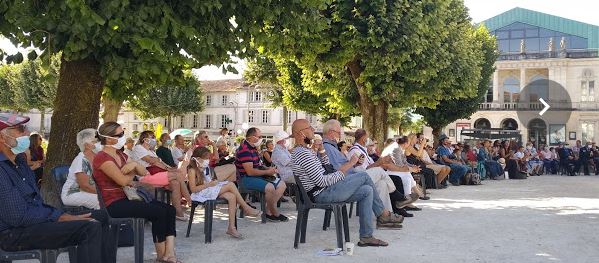
With the moral and technical support of the city of Saintes, the event was organised by ACDN (Action des Citoyens pour le Désarmement Nucléaire). This French NGO, founded in Saintes in 1996, continues to pursue its objectives. It is a member of "Abolition 2000", the international network of NGOs and cities that aims at abolishing all nuclear weapons and also at phasing out nuclear power-generation by means of energy economies and renewable energies.
The city of Saintes itself joined the network in June 2000. Since 2008 it has also been part of "Mayors for Peace", a global network of cities calling for the abolition of nuclear arms, under the presidency of the mayor of Hiroshima and the vice-presidency of the mayor of Nagasaki.
At 10.30 am the concert began with a piece by Louis Hilbrand entitled "Et après..." (i.e After Hiroshima...), played by Yuko Hirota. The late Louis Hilbrand was Yuko’s teacher in Geneva. Then Alice Rosset played Chopin’s 13th Nocturne (c minor), after which the two pianists played a duet - Schubert’s Fantasia in F minor. These were moving moments of artistic beauty.
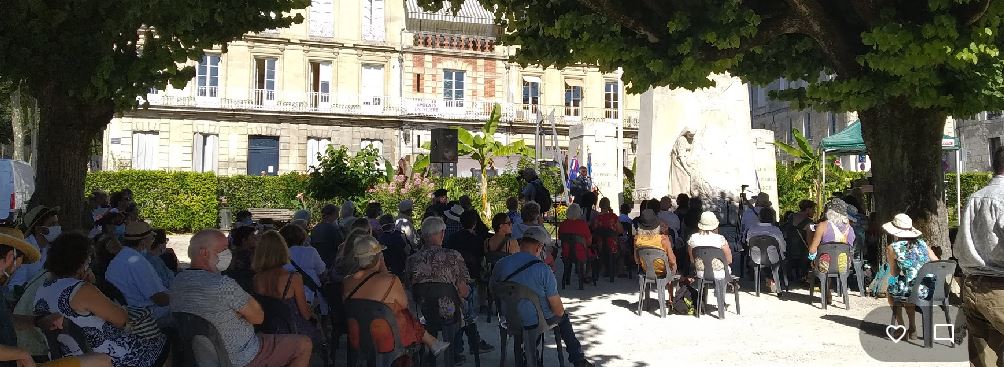
The concert then paused to make room for the ceremony in memory of the victims of Hiroshima and Nagasaki.
Jean-Marie Matagne, president of ACDN, read out messages sent by Kazumi Matsui, who is mayor of Hiroshima and president of Mayors for Peace, and by Tomihisa Taue, the mayor of Nagasaki. (See below)
Ammar Berdaï, assistant mayor of Saintes, then spoke in the name of the city. First he apologised for the absence of the mayor Bruno Drapron, who was kept elsewhere by his role as chairman of the Communauté d’agglomération, then he recalled that the city’s commitment to the abolition of nuclear weapons goes back more than 20 years, exactly to June 2000, during the mandate of Michel Baron, and that the Nuclear Disarmament Flame was first lit in Saintes on May 2001 by the then mayor Bernadette Schmitt, at the time of the 1st "Nuclear Disarmament Days" (See below).

Benoît Biteau, a farmer who was recently elected to represent the "Nouvelle Aquitaine" region in the European Parliament, then explained why he had regularly been present every year at the 6-9 August ceremonies in Saintes. It is a matter of defending life against all the "ultimate threats" - of which the worst is surely that of human self-destruction by atomic technology. In particular he stressed the fact that radioactivity of civilian origin can be as menacing as military bombs, as was proved by the disasters of Chernobyl and Fukushima.
The next speaker was Catherine Quéré, who had served for ten years as MP for Saintes & Saint Jean d’Angély. She explained how for several years she had resolutely argued among all her parliamentary colleagues for a bill to organise a referendum on France’s participation in the abolition of nuclear weapons (written and submitted by ACDN). By April 2017 when Parliament dissolved it had gained 126 signatures for a target of 185. (See below).
Patrick Moquay, former mayor of Saint Pierre d’Oléron, a city which he had joined like Saintes to the "Abolition 2000" and "Mayors for Peace" network, then read the list of the 46 MPs and Senators in the current Parliament who have signed the referendum bill in its current form. An appeal was made to citizens at the ceremony to encourage their elected representatives to co-sign this bill (See below).
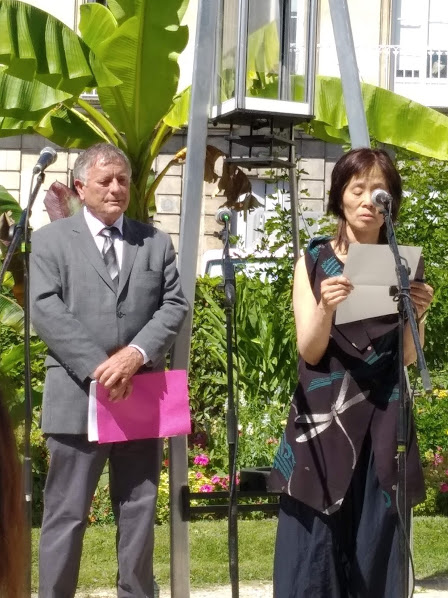
Next Juko Hirota read extracts from the moving testimony of Setsuko Thurlow, a hibakusha (bomb survivor) and longstanding activist for the elimination of all nuclear weapons. This had been presented at Oslo in 2017 when the Nobel Peace Prize was awarded to the International Campaign to Abolish Nuclear Weapons (ICAN).
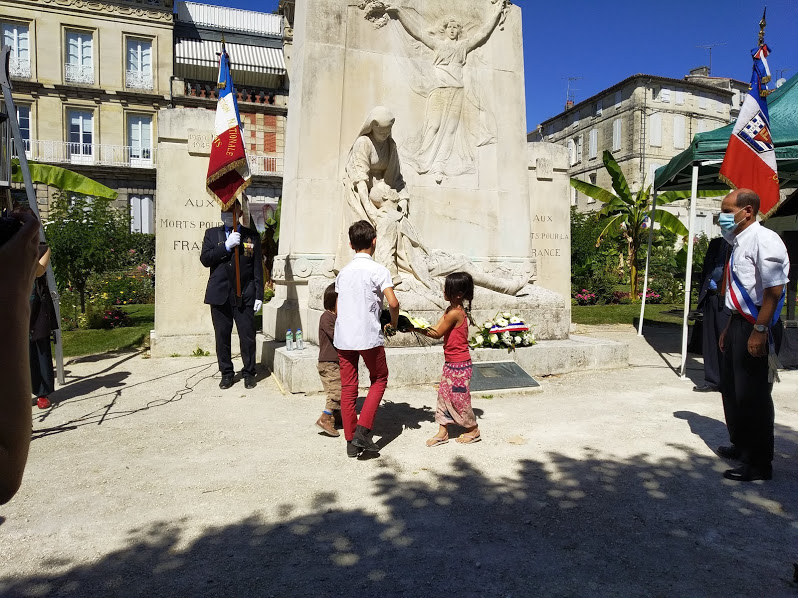
Then at the Monument to the Fallen a wreath was placed by Ammar Berdaï on behalf of the Saintes Municipality, and three young children, Titouan, Mina and Kan, placed another on behalf of ACDN.
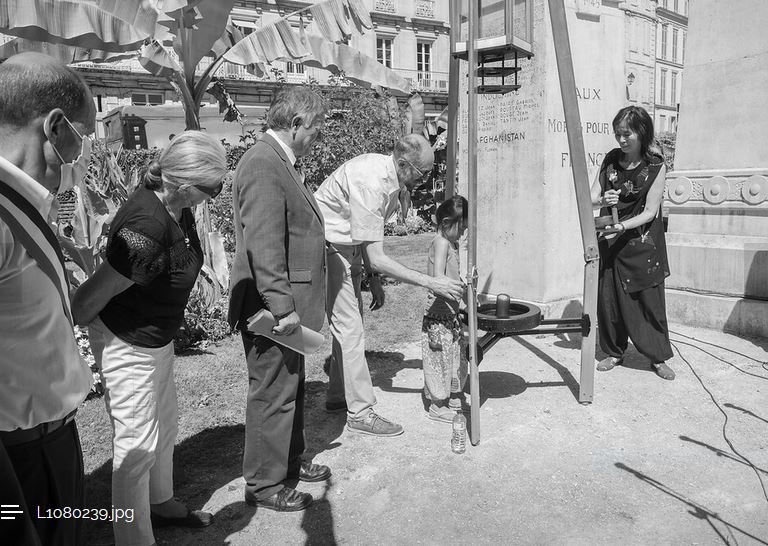
Next the Nuclear Disarmamanet Flame was re-lit by Mina, a 6-year-old Franco-Japanese girl. It had been lit back in July 2004 and carried proudly through the city by two hibakusha from the Hiroshima World Peace Mission, when they visited Saintes. After their speech. one of them had said "After Hiroshima, Saintes will now be the second city in my heart".
Then everyone present stood to respect a minute of silence in homage to the victims, while Yuko Hirota sounded a copper dish and three war veterans, flag-bearers of the ULAAC (Union Locale des Associations d’Anciens Combattants) lowered their French flags.
The concert then resumed, with Alice Rosset playing Jean-Sébastien Bach’s Partita n° 1, and the two pianists performing as duets two works of Ravel and finally Bach’s "Jesu Joy" from Cantata 147.
Their performance was saluted with a long standing ovation.
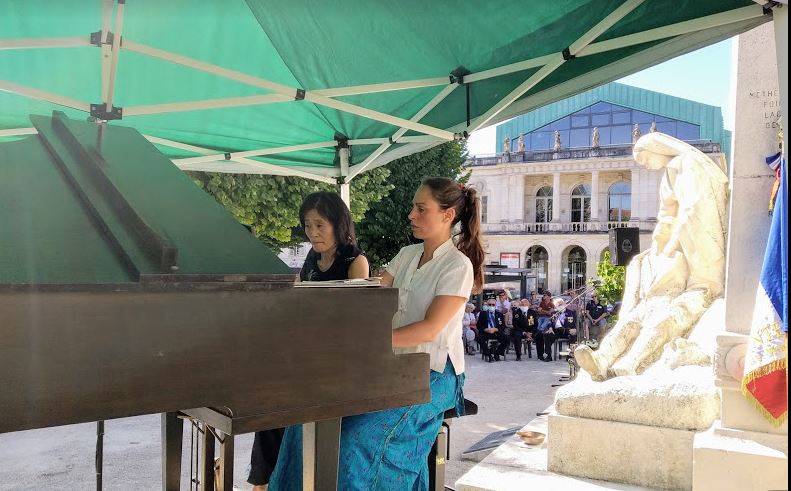
Despite the COVID-19 Pandemic which is rightly consuming energies around the world but which tends to make us forget the other threats hanging over us, it was necessary to remember the dramas of Hiroshima and Nagasaki so as to stress the extraordinary seriousness of the current nuclear danger and to proclaim, with the hibakusha, the survivors of the Bomb: "Never Again, Not for Anyone Anywhere!" .
DOCUMENTS
Black-and-white photos by Jean-Christophe Pratt
Article of Sud Ouest, 5 August 2020, announcing the concert
Haute Saintonge, 21 August 2020
***
Messages and testimonies
***
Message from Kazumi MATSUI, Mayor of Hiroshima, President of Mayors for Peace
It is an honor and a pleasure to send this message on the occasion of the Commemorative Ceremony andConcert for Hiroshima and Nagasaki, 6 August 2020.
On August 6, 1945, the first atomic bomb used in human warfare reduced Hiroshima to rubble in an instant, claiming countless innocent civilian lives. Despite suffering deep physical and emotional scars, the hibakusha who managed to survive tell their stories, continuously appealing for peace with their conviction: “No one else should suffer as we have.”
However, more than 13,000 nuclear warheads still remain around the world and nuclear disarmament is at a stand still. Furthermore, despite global solidarity becoming ever more important in the fight against COVID-19, a new kind of threat to all of humanity, we see self-centered nationalism in ascendance and tensions heightened by international exclusivity and rivalry around the world today. Our current leaders must recall their courageous predecessors : when the US and USSR, nuclear superpowers, were engaged in a tense, escalating nuclear arms race, their leaders demonstrated reason and turned to dialogue to seek disarmament. Leaders around the world should pursue negotiations on nuclear disarmament in good faith, as mandated by Article VI of the Nuclear Non-Proliferation Treaty, and respond to the yearning of civil society for the entry into force of the Treaty on the Prohibition of Nuclear Weapons, a milestone on the road to a nuclear-weapon-free world.
To achieve a peaceful, sustainable world, each and every one of us must confront our current situation head on, transcend differences of status or opinion, and strive together in the spirit of tolerance toward our ideal. To accomplish this, we must never dismiss the atomic bombings and the war as mere events of the past. It is vital that we take on board the progress the hibakusha and others have made toward a peaceful world and drive steadfastly forward.
In order for world leaders to move forward together with them to advance civil society’s ideal, it is of increasing importance that we raise the number of people in civil society who empathize with the plea of the hibakusha. A world free from nuclear weapons is the first step toward peace on Earth and this concept must become a universal value shared by all humankind. It is therefore truly significant that you have come together and organized this event to call for a peaceful world free of nuclear weapons and I extend to you my deepest respect.
Mayors for Peace, composed of over 7,900 member cities from 164 countries and regions, intends to create an environment that encourages world leaders to take steps towards nuclear abolition. I would like to ask all of you to mobilize with us and strive to eliminate the absolute evil that is nuclear weapons to realize lasting world peace.
In closing, I extend my best wishes for the great success of this event as well as the good health and happiness of all concerned.
August 6, 2020
MATSUI Kazumi
President of Mayors for Peace
Mayor of Hiroshima
***
Message from Tomihisa TAUE, Mayor of Nagasaki
On behalf of the citizens of Nagasaki, I would like to extend this message to the “Flame for Nuclear Disarmament.”
At 11:02 a.m. on August 9, 1945, Nagasaki was devastated by a single atomic bomb. More than 74,000 precious lives were lost, and a further 75,000 were injured. Even today, those who narrowly survived carry deep mental and physical scarsthat will never healand continue to suffer from aftereffects due toradiation exposure.
The hibakusha,those who have experienced the terror of nuclear weapons firsthand, have continued to relay their painful experiences and appeal for the abolition of nuclear weaponsto ensurethat no one else in the world ever experiences the tragedy of an atomic bombing. However, it has been 75years since the atomic bombingsand the number of individuals who can recount their experiences dwindles with each passing year. An age where there are no more hibakushacloses in upon us everysecond.
His Holiness Pope Francis stated: “…A world without nuclear weapons is possible and necessary.”Last Novemberduring a visit to Nagasaki, His Holinessgave this strong and explicit message to the world at the hypocenter 500 meters above which the bomb detonated.
His Holiness also stated that everyone needs to participate in order to realize a world without nuclear weapons.
Fueled by Pope Francis’s words, we civil citizens must band together and continue to raise our voices to realize the abolition of nuclear weapons as soon as possible. Everyone’s individual and invaluable efforts canbecome a tremendous driving force that will lead us to peace.
Through this year’s“Flame for Nuclear Disarmament” ceremony,heldduring the 75thyear since the atomic bombing,I hope that you will share in our wish for peace and call out forthe abolition of nuclear weapons.
TAUE Tomihisa
Mayor of Nagasaki
August 2020
***
Speech of Ammar Berdaï, Assistant Mayor of Saintes
Bonjour Mesdames, bonjour Messieurs,
I beg you please to excuse the absence of our Mayor, M. Bruno Drapron, who is kept away by other obligations. He would have liked to be here today. He gave me the task of speaking in his name and in the name of the city.
This ceremony has become a very important tradition in Saintes, and particularly this year when we commemorate the 75th anniversary of the bombings of Hiroshima and Nagasaki on August 6 and 9, 1945.
In June 2000, when Michel Baron was Mayor, Saintes joined the "Abolition 2000" network, and then a few years later joined "Mayors for Peace".
We cannot but be proud that our city belongs to these international networks, both of which wish to abolish nuclear weapons.
In 2001 the first Nuclear Disarmament Flame was lit here, by the then Mayor Bernadette Schmitt.
Saintes has welcomed numerous national and international events focussing on the military and non-military denuclearisation of our planet, in the course of the last twenty years.
In 2006 and 2008 during the 2nd and 3rd International Gatherings for Disarmament - nuclear, biological and chemical - the Hiroshima and Nagasaki trees were planted here at La Palu.
ACDN, a national NGO based in Saintes, will be able to count on this municipality to bring all its support in order to perpetuate this tradition.
"A world without nuclear weapons, that is the dream of all humanity."
***
Speech of Catherine Quéré, former MP
My friend Jean-Marie has asked me to explain here, as an ex-MP for the electorate of Saintes & Saint Jean d’Angély, the value and importance of the Referendum Bill which he submitted to me in 2015-16 in the name of ACDN.
I endorsed and actively supported this bill in speaking to fellow MPs of all political hues, so much so that in April 2017, when that parliament was dissolved, the bill had gained 126 signatures out of 185, which makes two-thirds of the number required to push a shared-initiative referendum past its first stage in the procedure.
I think this is a just initiative and I continue to support it as an ordinary citizen. Nuclear and radioactive weapons are horrible. They can not only massacre hundreds of thousands, even millions of people in one blow, but in addition their radioactivity attacks the DNA of cells, causing fatal illnesses like cancer, cardio-vascular illnesses, and worst all genetic anomalies and the birth of monster infants.
These arms can jeopardise at any moment the lives of all of us and the survival of humankind. What use is it to fight against climate deterioration if the apocalypse can come? We must rid the planet of these weapons. And we can, if we seize the referendum tool to compel France to do her duty and summon the other nuclear-armed states to the negotiations foreshadowed in Article VI of the Non-Proliferation Treaty, which they have signed.
That is the meaning of my presence with you today. I wish that you, I wish that we will continue this struggle.
***
Speech of Patrick Moquay, former mayor of Saint Pierre d’Oléron, former president of the Communauté de Communes de l’Ile d’Oléron, member of ACDN’s board.
So far the Bill aimed at organising a referendum on France’s participation in the abolition of nuclear and radioactive weapons has received the following signatures of current parliamentarians:
[Those not named as senators are MPs, members of the National Assembly]
Jean-Félix Acquaviva, Haute-Corse ; Sophie Auconie, Indre et Loire ; Marie-Noëlle Battistel, Isère ; Esther Benbassa, Senator for Paris ; Justine Benin, Guadeloupe ; Eric Bocquet, Senator for the Nord ; Moetai Brotherson, Polynésie française ; Alain Bruneel, Nord ; Marie-George Buffet, Seine-Saint-Denis ; André Chassaigne, Puy-de-Dôme ; Jean-Michel Clément, Vienne ; Laurence Cohen, Senator for Val-de-Marne ; Yves Daniel, Loire-Atlantique ; Pierre Dharréville, Bouches du Rhône ; Jeanine Dubié, Hautes Pyrénées ; M’jid El Guerrab, Français établis hors de France ; Olivier Falorni, Charente Maritime ; Michelle Gréaume, Senator for the Nord ; Nadine Grelet-Certenais, Senator for Sarthe ; Sébastien Jumel, Seine-Maritime ; Mansour Kamardine, Mayotte ; Claudine Kauffmann, Senator for Var ; Jacques Krabal, Aisne ; Joël Labbé, Senator for Morbihan ; Bernard Lalande, Senator for Charente Maritime ; Jérôme Lambert, Charente ; François Michel Lambert, Bouches-du-Rhône ; Jean-Paul Lecoq, Seine-Maritime ; Paul Molac, Morbihan ; Jean-Philippe Nilor, Martinique ; Pierre Ouzoulias, Senator for Hauts-de-Seine ; Bertrand Pancher, Meuse ; Hervé Pellois, Morbihan ; Christine Pirès Beaune, Puy-de-Dôme ; Loïc Prud’homme, Gironde ; Christine Prunaud, Senator for Côtes d’Armor ; Muriel Ressiguier, Hérault ; Fabien Roussel, Nord ; Sabine Rubin, Seine-Saint-Denis ; Maina Sage, Polynésie Française ; Gabriel Serville, Guyane ; Bénédicte Taurine, Ariège ; Jean-Claude Tissot, Senator for the Loire ; Michèle Victory, Ardèche ; Hubert Wulfranc, Seine Maritime ; Michel Zumkeller, Territoire de Belfort.
These signatories belong to the following parliamentary groupings:
in the National Assembly: UDI, Agir et Indépendants ; Libertés et Territoires ; le Mouvement Démocrate et apparentés ; la Gauche Démocrate et Républicaine ; La République En Marche ; Les Républicains ; les Socialistes et apparentés ; La France Insoumise ; l’Union des Démocrates, Radicaux et Libéraux.
in the Senate: Groupe Communiste Républicain Citoyen et Ecologiste ; Groupe socialiste et républicain ; Rassemblement Démocratique et Social Européen ; les Non-inscrits.
We call on all French citizens to ask their MPs and Senators, whatever their political colour, to please sign this Bill.
***
The Testimony of Setsuko Thurlow, Hiroshima survivor, spoken at ceremony when the Nobel Peace Prise was awarded to ICAN (The International Campaign to Abolish Nuclear Weapons). Extracts read by Yuko Hirota.
I was just 13 years old. I still vividly remember that morning. At 8:15, I saw a blinding bluish-white flash from the window. I remember having the sensation of floating in the air.
I regained consciousness in the silence and darkness, I found myself pinned by the collapsed building. I began to hear my classmates’ faint cries: "Mother, help me. God, help me."
Then, suddenly, I felt hands touching my left shoulder, and I heard a man saying: "Don’t give up! Keep pushing! I am trying to free you. See the light coming through that opening? Crawl quickly towards it." As I crawled out, the ruins were on fire. Most of my classmates in that building were burnt to death alive. I saw all around me utter, unimaginable devastation.
Processions of ghostly figures shuffled by. Grotesquely wounded people, they were bleeding, burnt, blackened and swollen. Parts of their bodies were missing. Flesh and skin hung from their bones. Some with their eyeballs hanging in their hands. Some with their bellies burst open, their intestines hanging out. The foul stench of burnt human flesh filled the air.
Thus, with one bomb, my beloved city was obliterated. Most of its residents were civilians, who were incinerated, vaporized, carbonized - among them, members of my own family and 351 of my schoolmates.
In the weeks, months and years that followed, many thousands more would die, often in random and mysterious ways, from the delayed effects of radiation. Still to this day, radiation is killing survivors.
Whenever I remember Hiroshima, the first image that comes to mind is of my four-year-old nephew Eiji - his little body transformed into an unrecognizable melted chunk of flesh. He kept begging for water in a faint voice until his death released him from agony.
To me he came to represent all the innocent children of the world, threatened as they are at this very moment by nuclear weapons. Every second of every day, nuclear weapons endanger everyone we love and everything we hold dear. We must not tolerate this insanity any longer.
See: "A referendum to abolish nuclear and radioactive weapons", Op-ed in Le Monde, 14 February 2020 (translated in English)
